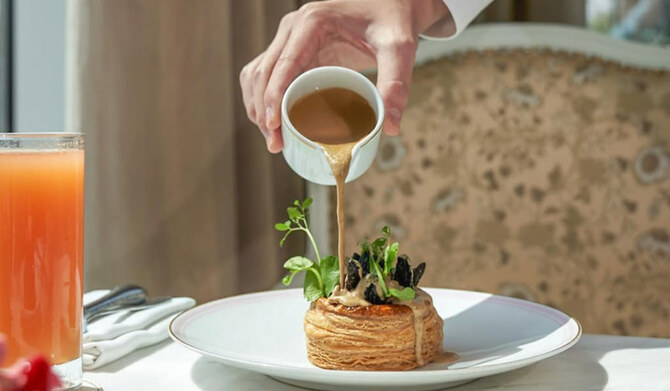Laduree, in Jeddah’s Fayfa Avenue, blends the brand’s heritage of Parisian elegance with the rich essence of Arabian culture. This renowned patisserie has long been celebrated for its iconic macarons and pastries, and the Jeddah location does not disappoint.
Their macarons are works of art: delicate, flavorful, perfectly crafted and simply divine. Varieties include salted caramel, pistachio, rose, and chocolate.
The Eugenie macarons, with flavors including Marie-Antoinette tea and blackcurrant Violette, add an extra layer of sophistication. These treats are beautifully presented in gift boxes, making them perfect for presents to allow a friend to indulge in a sweet moment.
The menu features a wide range of delicacies, including flaky croissants (try the chocolate-pistachio or zatar walnut), savory breakfast options such as eggs Florentine and the signature Laduree omelet, and a delightful brunch spread.
The brunch platter is an absolute highlight, offering a variety of sweet and savory items, including warm French toast, Laduree’s signature granola, and fresh fruit salad. The addition of a macaron and a beverage makes it a well-rounded and indulgent experience.
The lunch menu includes mushroom risotto, grilled salmon, and gnocchi truffle asparagus. Each dish is crafted with care and attention to detail.
The main courses are substantial, and the quality of the ingredients shines through. A particular favorite is the vol-au-vent filled with chicken or salmon, served with a mushroom sauce that is rich, buttery, and satisfying.
There are numerous dessert options available. The isaphan yule log and traditional galette are both equally impressive, with layers of flavors and textures that transport you to a Parisian patisserie.
Laduree’s prices are relatively high, but the experience is undeniably luxurious and the menu features a variety of delightful dishes in each of which the attention to detail is evident.
Check @ladureesaudiarabia on Instagram for more details.






























